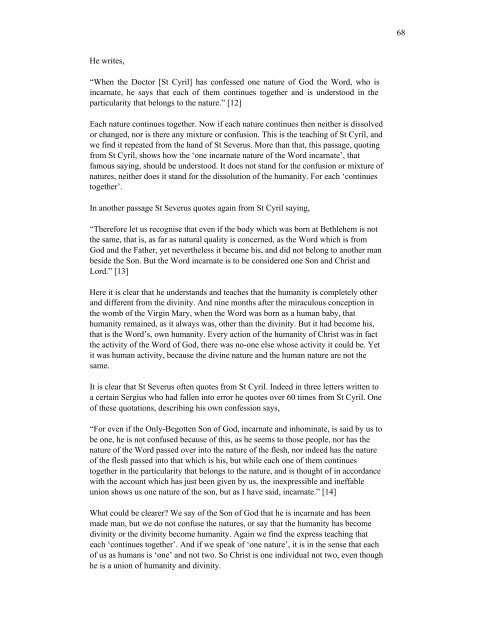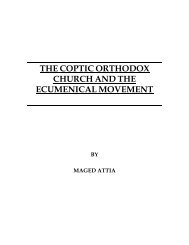Coptic interpretations of the Fourth Ecumenical Council - Saint Mina ...
Coptic interpretations of the Fourth Ecumenical Council - Saint Mina ...
Coptic interpretations of the Fourth Ecumenical Council - Saint Mina ...
Create successful ePaper yourself
Turn your PDF publications into a flip-book with our unique Google optimized e-Paper software.
He writes,<br />
“When <strong>the</strong> Doctor [St Cyril] has confessed one nature <strong>of</strong> God <strong>the</strong> Word, who is<br />
incarnate, he says that each <strong>of</strong> <strong>the</strong>m continues toge<strong>the</strong>r and is understood in <strong>the</strong><br />
particularity that belongs to <strong>the</strong> nature.” [12]<br />
Each nature continues toge<strong>the</strong>r. Now if each nature continues <strong>the</strong>n nei<strong>the</strong>r is dissolved<br />
or changed, nor is <strong>the</strong>re any mixture or confusion. This is <strong>the</strong> teaching <strong>of</strong> St Cyril, and<br />
we find it repeated from <strong>the</strong> hand <strong>of</strong> St Severus. More than that, this passage, quoting<br />
from St Cyril, shows how <strong>the</strong> ‘one incarnate nature <strong>of</strong> <strong>the</strong> Word incarnate’, that<br />
famous saying, should be understood. It does not stand for <strong>the</strong> confusion or mixture <strong>of</strong><br />
natures, nei<strong>the</strong>r does it stand for <strong>the</strong> dissolution <strong>of</strong> <strong>the</strong> humanity. For each ‘continues<br />
toge<strong>the</strong>r’.<br />
In ano<strong>the</strong>r passage St Severus quotes again from St Cyril saying,<br />
“Therefore let us recognise that even if <strong>the</strong> body which was born at Bethlehem is not<br />
<strong>the</strong> same, that is, as far as natural quality is concerned, as <strong>the</strong> Word which is from<br />
God and <strong>the</strong> Fa<strong>the</strong>r, yet never<strong>the</strong>less it became his, and did not belong to ano<strong>the</strong>r man<br />
beside <strong>the</strong> Son. But <strong>the</strong> Word incarnate is to be considered one Son and Christ and<br />
Lord.” [13]<br />
Here it is clear that he understands and teaches that <strong>the</strong> humanity is completely o<strong>the</strong>r<br />
and different from <strong>the</strong> divinity. And nine months after <strong>the</strong> miraculous conception in<br />
<strong>the</strong> womb <strong>of</strong> <strong>the</strong> Virgin Mary, when <strong>the</strong> Word was born as a human baby, that<br />
humanity remained, as it always was, o<strong>the</strong>r than <strong>the</strong> divinity. But it had become his,<br />
that is <strong>the</strong> Word’s, own humanity. Every action <strong>of</strong> <strong>the</strong> humanity <strong>of</strong> Christ was in fact<br />
<strong>the</strong> activity <strong>of</strong> <strong>the</strong> Word <strong>of</strong> God, <strong>the</strong>re was no-one else whose activity it could be. Yet<br />
it was human activity, because <strong>the</strong> divine nature and <strong>the</strong> human nature are not <strong>the</strong><br />
same.<br />
It is clear that St Severus <strong>of</strong>ten quotes from St Cyril. Indeed in three letters written to<br />
a certain Sergius who had fallen into error he quotes over 60 times from St Cyril. One<br />
<strong>of</strong> <strong>the</strong>se quotations, describing his own confession says,<br />
“For even if <strong>the</strong> Only-Begotten Son <strong>of</strong> God, incarnate and inhominate, is said by us to<br />
be one, he is not confused because <strong>of</strong> this, as he seems to those people, nor has <strong>the</strong><br />
nature <strong>of</strong> <strong>the</strong> Word passed over into <strong>the</strong> nature <strong>of</strong> <strong>the</strong> flesh, nor indeed has <strong>the</strong> nature<br />
<strong>of</strong> <strong>the</strong> flesh passed into that which is his, but while each one <strong>of</strong> <strong>the</strong>m continues<br />
toge<strong>the</strong>r in <strong>the</strong> particularity that belongs to <strong>the</strong> nature, and is thought <strong>of</strong> in accordance<br />
with <strong>the</strong> account which has just been given by us, <strong>the</strong> inexpressible and ineffable<br />
union shows us one nature <strong>of</strong> <strong>the</strong> son, but as I have said, incarnate.” [14]<br />
What could be clearer? We say <strong>of</strong> <strong>the</strong> Son <strong>of</strong> God that he is incarnate and has been<br />
made man, but we do not confuse <strong>the</strong> natures, or say that <strong>the</strong> humanity has become<br />
divinity or <strong>the</strong> divinity become humanity. Again we find <strong>the</strong> express teaching that<br />
each ‘continues toge<strong>the</strong>r’. And if we speak <strong>of</strong> ‘one nature’, it is in <strong>the</strong> sense that each<br />
<strong>of</strong> us as humans is ‘one’ and not two. So Christ is one individual not two, even though<br />
he is a union <strong>of</strong> humanity and divinity.<br />
68








